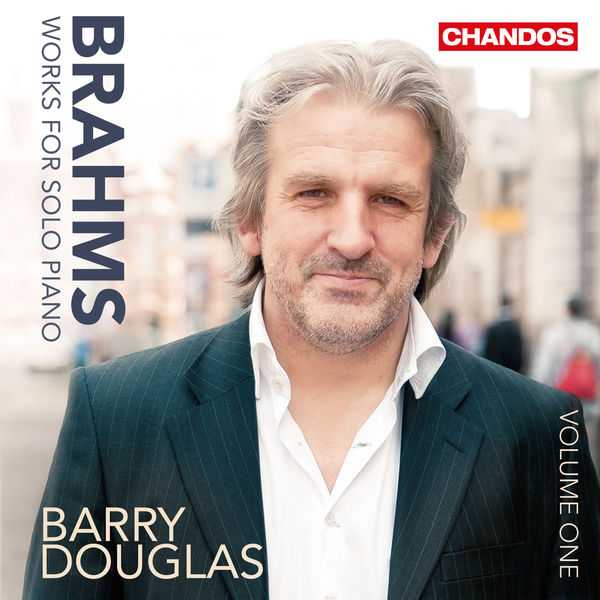

Composer: Johannes Brahms
Performer: Barry Douglas
Format: FLAC (tracks)
Label: Chandos
Catalogue: CHAN10716
Release: 2012
Size: 1.1 GB
Recovery: +3%
Scan: cover
2 Rhapsodies, Op. 79
01. No. 1 in B Minor
7 Fantasies, Op. 116
02. No. 4, Intermezzo in E Major
6 Klavierstücke, Op. 118
03. No. 2, Intermezzo in A Major
7 Fantasies, Op. 116
04. No. 1, Capriccio in D Minor
3 Intermezzi, Op. 117
05. No. 1 in E-Flat Major
2 Rhapsodies, Op. 79
06. No. 2 in G Minor
6 Klavierstücke, Op. 118
07. No.5, Romance in F Major
7 Fantasies, Op. 116
08. No. 7, Capriccio in D Minor
4 Ballades, Op. 10
09. No. 4 in B Major
7 Fantasies, Op. 116
10. No. 3, Capriccio in G Minor
11. 25 Variations and Fugue on a Theme by Handel, Op. 24
This is Volume 1 in a new series devoted to the Works for Solo Piano by Johannes Brahms, starting with a selection of highly personal collections of Capriccios, Intermezzi, Ballades, a Romance, and Rhapsodies.
The series also marks the first major project of the internationally acclaimed pianist Barry Douglas as an exclusive Chandos artist. Since winning the Gold Medal at the 1986 Tchaikovsky International Piano Competition in Moscow, Douglas has established a major international career, and his reputation as a pianist and conductor continues to grow.
Douglas was the soloist in the 2011 recording of Nino Rota’s Concerto soirée (CHAN10669), of which International Piano said: ‘For pianophiles, the headline message is undoubtedly “Barry’s back”. A complete Brahms series beckons, for which this definitely whets the appetite.’
Brahms wrote his set of four Ballades, Op. 10 (of which No. 4 is included on this disc) at the age of twenty-one, and at a time of much personal upheaval. His friend and patron Schumann had attempted suicide and been confined to a sanatorium near Bonn, and Brahms had been thrust into the role of protector and comforter of Schumann’s wife, Clara, while coming to terms with his own strong feelings for her. Reflective of the difficult situation, this work displays a deep-felt blend of the dramatic and the lyrical.
Perhaps the climax of Brahms’ activities as a composer came with the Variations and Fugue on a Theme by Handel, Op. 24. This was Brahms’s first major compositional statement following his 1860 ‘Manifesto’ against the ‘New German School’. The choice of a baroque theme, the strictness of the variations, the richness and scope of the piano technique, and the display of contrapuntal method in the Fugue, all combine to present Brahms in the role of ‘Preserver of Tradition’. Even Wagner saw the importance of the work, commenting grandly that it showed what could still be done with the old forms by someone who knew how to use them.
The predominant mood of the three Intermezzos on this disc is reflective and deeply introspective, which is in strong contrast to Brahms’s Capriccios, which are passionate, almost volatile, in character. The Romance, Op. 118 No. 5 completes the disc. This is a tuneful piece, which displays the lilt almost of a folksong.
Irish pianist Barry Douglas has largely avoided recording, but has made a substantial reputation on the concert stage. You’d think he might have cultivated a commanding, public style, but in this first-in-a-series album of Brahms piano works, he instead offers quiet, finely wrought interpretations. The programming concept itself is a bit involved, but Douglas pulls it off: instead of offering short works in complete sets, he picks and chooses in order to create a convincing sequence of moods and modes of expression. Here, Douglas sets Brahms’ late works against broader works from earlier in the composer’s career. His control over the Intermezzo, Capriccio, and Romance sets of Opp. 116, 117, and 118, is extraordinary, and few pianists have ever evoked so well the quintessential reaction to late Brahms: that when you hear the performance just once, you have an uncanny feeling of barely having scratched the surface. In Douglas’ hands, the larger Rhapsodies, Op. 79, and the Ballade in B major, Op. 10/4, almost inspire relaxation: here Douglas turns up the volume and revels a bit in the melodies. It’s almost as if these are intermezzi among the brutally complex actual intermezzi. The largest piece on the program, the Variations and Fugue on a Theme by Handel, Op. 24, takes on a slightly ecstatic quality in its finale placement, akin to the variation sets in late Beethoven. Quiet though it is, this is an ambitious, arresting, and often profound set of Brahms piano pieces, beautifully recorded.



